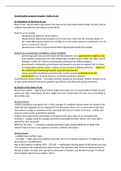Summary
summary chapter 1 rule of law social studies bricks
- Course
- Level
summary of chapter 1 rule of law of the textbook social studies of bricks. in the book all the concepts are explained in a difficult way. in this summary I explained everything in such a way that every concept is easy to understand. with the help of my summaries, I was able to have a 9.3 in total a...
[Show more]



